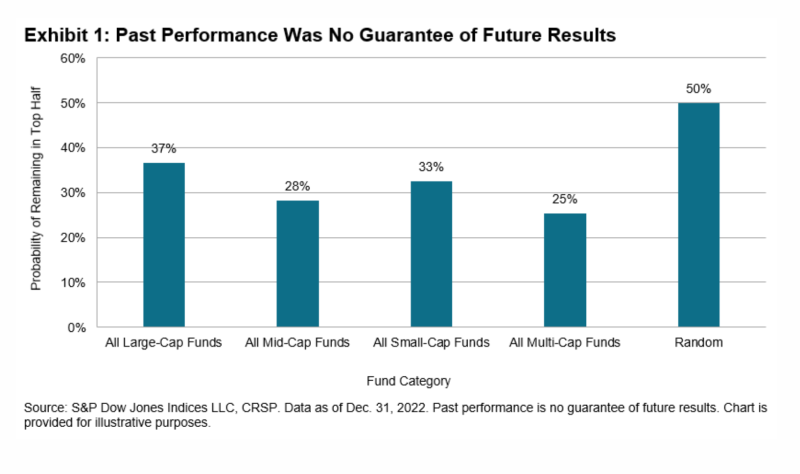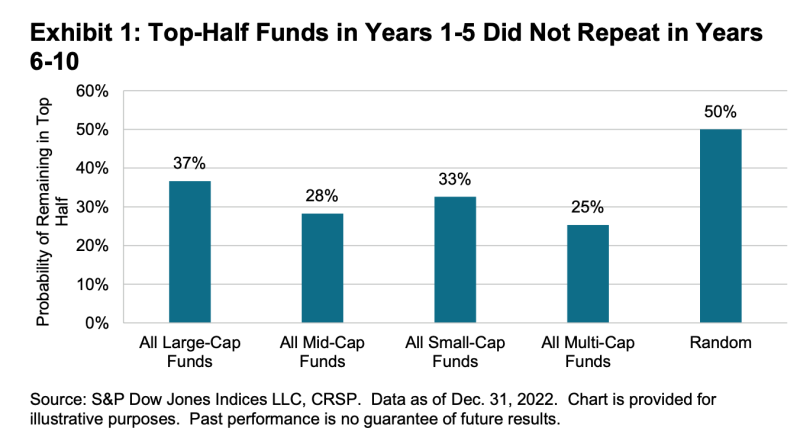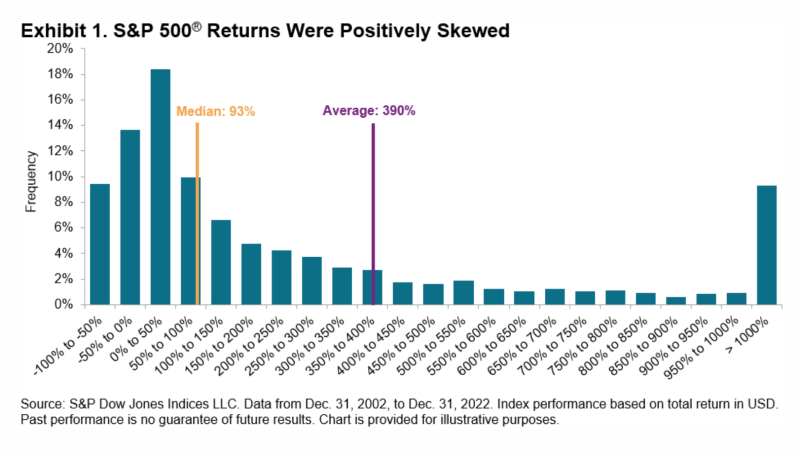Luck pretending to be skill: self-attribution bias in active management
Comments Off on Luck pretending to be skill: self-attribution bias in active management
Self-attribution bias is the tendency to attribute success to one’s own skills and abilities while attributing failures to external factors like luck or circumstances. We’re all guilty of it, and a new study shows that it’s rife in active fund management.
Think back to your time at school or university. The chances are, like most of us, some of your exam results were better than others. Now try to recall what you might have said — to yourself and to other people — in both of those instances.
When students score top marks in an exam, they tend to put it down to their own intelligence or hard work. When they mess up, they might blame the teacher for not explaining the course material better, or the exam board for setting such difficult questions.
This is a classic example of what behavioural psychologists call self-attribution bias. The term refers to the way we tend to attribute positive outcomes to our own abilities or efforts, while attributing negative outcomes to factors beyond our control.
It happens in all walks of life. A CEO, for example, will often attribute good financial results to positive changes they’ve introduced, and poor results to, say, the economic climate. Similarly, a football manager might tell himself that victories are down to his tactical nous, while blaming defeats on poor refereeing or plain bad luck.
Studies have shown how the same thing happens in investing. When our returns are good we like to congratulate ourselves for making astute decisions; when they’re poor, we might blame our financial adviser, or the newspaper columnist whose tips we were acting on.
Pros are susceptible too
But it’s not just ordinary investors who display self-attribution bias. Financial professionals are guilty of it too. Now a new study, entitled Heads I Win, Tails It’s Chance, by Meng Wang from Georgia State University, shows just how prevalent the bias is among active fund managers and how it negatively impacts their performance.
Wang used artificial intelligence software to examine the statements made by US fund managers in official shareholder reports called N-CSR filings that they are required to file with the regulator, the SEC. In these documents, managers typically explain the factors that have either contributed to, or detracted from, their investment performance.
Wang divided these statements into two — those that linked performance to internal factors such as skilful stock selection, and those that attributed outcomes to external factors such as the economic environment or prevailing conditions in specific sectors.
To evaluate the extent to which each manager displayed self-attribution bias, he created a measure called the self-attribution score (SAS), ranging from -1 to 1. The higher the SAS score, the more likely the fund manager was to credit themselves for good outcomes and blame external factors for bad ones.
The data set he used included 15,434 shareholder reports associated with 1,969 unique funds between 2006 and 2018.
What the study found
On average, Meng Wang found, 41% of the factors attributed to performance contributors were external, while 59% were internal. Conversely, 83% of the factors attributed to performance detractors were external, and 17% were internal.
Fund managers were, on average, 40.6% more likely to attribute performance contributors to internal factors than performance detractors.
In other words, the findings suggest that fund managers tend to internalise successes, attributing them to skill, and externalise failures, attributing them to bad luck.
But more interesting still is the finding that managers who displayed a stronger self-attribution bias tended to engage in more trading in the subsequent reporting period. Studies have shown that fund managers who trade more frequently are often overconfident and inclined to take excessive risks. These traits, in turn, are usually associated with inferior investment performance.
Another finding of note is that although the funds Wang looked at exhibited a higher self-attribution bias after periods of strong performance, biased attribution only influenced fund flows when funds performed poorly. To put it another way, investors ignored managers’ self-attribution bias when the fund performed well, thereby exhibiting self-attribution bias themselves in their choice of funds.
Lessons for investors
It’s already well documented that behavioural biases can be very detrimental to investment returns. It’s often suggested, however, that fund managers and other investment professionals are somehow immune to these biases, or at least less likely to succumb to them than the rest of us. However this latest study is one of many which show that professionals are affected as well.
More worrying still for those investors who use actively managed funds is that fund managers who exhibit self-attribution bias are also more likely to be overconfident and to engage in excessive risk-taking. There have certainly many instances of “star” managers whose performance flopped as a result of taking on too much risk.
Investors should stay on their guard against their own irrational tendencies. They should avoid acting on their emotions or following the herd. They should also be mindful of their own limitations and pay more attention to long-term trends than to recent events.
But they should also be wary of the behavioural biases of financial professionals acting on their behalf, including financial advisers and, especially, fund managers.
Remember, the best way to avoid any negative impact from behavioural biases is to use index funds — or other systematic, rules-based funds — that take human behaviour out of the decision-making process altogether.
ABOUT THE AUTHOR
ROBIN POWELL is the editor of The Evidence-Based Investor. He works as a journalist, author and consultant specialising in finance and investing. He is the co-author of two books, Invest Your Way to Financial Freedom and How to Fund the Life You Want, and his company Regis Media provides high-quality video content for advice firms and other financial businesses.
ALSO BY ROBIN POWELL
A watershed moment for UK financial advice
There’s hope yet for St James’s Place
Private credit has its dangers — caveat emptor
CONTENT FOR ADVICE FIRMS
Through our partners at Regis Media, TEBI provides a wide range of high-quality content for financial advice and planning firms. The material is designed to help educate clients and to engage with prospects.
As well as exclusive content, we also offer a wide range of pre-produced videos which explain how investing works and the valuable role that a good financial adviser can play.
If you would like to find out more, why not visit the Regis Media website and YouTube channel? If you have any specific enquiries, email Robin Powell, who will be happy to help you.
© The Evidence-Based Investor MMXXIII



